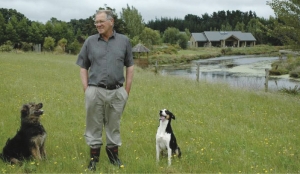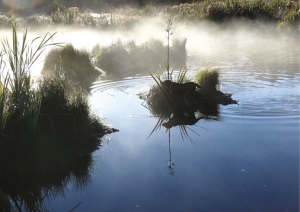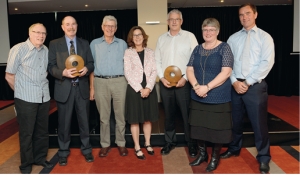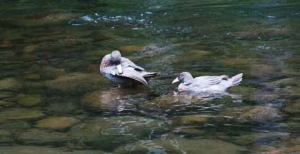Displaying items by tag: Environment
Change attitudes and improve the environment
Change attitudes and improve the environment
Into this area a few years ago stepped Ducks Unlimited member Ossie Latham, and his conscious was pricked by the degradation he saw in the waterways near his home.
Growing up on the banks of the Oroua River downstream from Feilding, part of a third generation on both maternal and paternal sides of his family he remembers: “During that time the Oroua had gone from a pristine small river where kids could swim in deep holes, dive off the road bridge, catch eel, trout and flounder, to a gravel choked conduit for industrial, town and farm waste. A dead waterway, the greatest degradation happened in my time as a kid,” said Ossie.
Then came concern for the Manawatu River and its’ tributaries of which the Oroua is one. The Manawatu River Accord was set up and out of that spun the Oroua Catchment Care Group. Ossie attended their meetings and the Oroua Group decided the best way to tackle the problems was to think catchment wide
but act local to address whatever issues may be in any given area. The Mangaone West stream where Ossie and wife Mary live is a tributary of the Oroua. Ossie volunteered to be champion for that area.
As a local champion his job was to gage the support of residents for a collective effort to address issues of farming and lifestyle practises that degrade the environment.
“Once sufficient interest was identified, we called a community meeting and established the Mangaone West Landcare Group.
Neil Managh, coordinator of the original group gave his support to Ossie who
then called on the leading farmers in the area, the local school principal, known
environmentalists, friends and acquaintances and got their commitment to the scheme.
“We organised a community wide pamphlet drop calling a public meeting and away we went,” Ossie said.
whatever we do to our landscape sooner or later affects our wetlands and waterways, I think it is worth DU members thinking about what happens upstream from their favourite dam, wetland or waterway.
About 60 percent of landowners are part of the group. All major farmers bar two are committed and interest is growing. There is a diversity of views on what best practise is and just what is sustainable but Ossie said they cope with this by agreeing that “Sustainability is the ability of the current generation to meet its needs, without compromising the ability of future generations to meet theirs.”
“I’m not sure where I got the quote from but it gained widespread acceptance to what we are on about.
“We recognise it’s taken over 100 years to get where we are now, so we expect our work to improve our chosen living spaces to be intergenerational. While the stream is our common bond, we love our landscape which the stream and we are part off.”
(Afterthought)
“After doing the question and answer bit for you I got to thinking, what is the key for many of the settler families who are part of our group? Many of them are 3rd and 4th generation; they have a strong sense of stewardship, a concept that is evolving as our knowledge of interdependence grows. It’s good to be part of their efforts.”
Bring back lead shot
Call to bring back lead shot for duck shooting
River Story Award and Morgan Foundation
In conjunction with Kaiwaiwai Dairies Ltd, Ducks Unlimited NZ won joint first place in the River Story Award at a recent Morgan Foundation Dinner.
Held at the Ridges Hotel in Wellington, the Award recognises conservation efforts to improve water quality before it enters lakes and waterways.
Kaiwaiwai Dairies received the award for the construction of a serpentine waterway on their farm to slow the passage of the water down, thereby allowing more time for nature to extract nutrients from the water.
DUNZ was recognised for the effort we have put into Wairio (Southern Wairarapa) for not only the creation of water fowl habitat but for also slowing down the water so when it enters Lake Wairarapa it has a greatly reduced nutrient loading.
Our thanks go to all the organisations that have contributed time and money over the last 10 years.
The family of Joanne and Gareth Morgan of Wellington established this charitable trust primarily for the purpose of reducing wealth disparities between people. In particular the focus of the Foundation is on improving the lives of the poorest folk in the world and enabling people to participate in their society and workplaces to the full extent of their potential. The Foundation work extends in New Zealand to public interest research and education as well as to investment in conservation and natural environmental enhancement.
The trustees are Joanne, Gareth and independent Charles Purcell. The advisory board for the trust comprises the Morgan’s four children – Ruby, Floyd, Jessi and Sam. The Manager of the Trust is Margaret Mather, whose responsibilities include liaising with applicants for funding, administering the grants programme, and ensuring the Foundation participates in philanthropic community activities to the extent the trustee’s desire. The trust has no religious orientation although willingly finances religious-based organisations doing work that satisfies their criteria.




